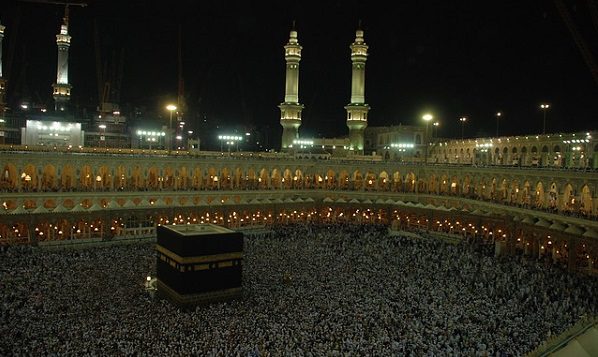By Laura P.
Hajj season is always somewhat bittersweet for me.
For a number of years after I converted, I didn’t have enough savings to contemplate going on hajj. More recently, as my financial situation improved for the better and as I remosqued, I began to look more seriously into what would be necessary to undertake the pilgrimage.
Here I discovered a major roadblock: As a convert I have no Muslim relatives, and I have chosen not to marry. The hajj, it turns out, is not accessible for a woman without a man.
Under the rules set by the Kingdom of Saudi Arabia, a woman who wishes to obtain a hajj visa must either be accompanied by a Muslim mahram (adult male relative), or be over the age of 45 and submit a notarized “no objection” letter from a husband, son, or brother, then travel with a group. The U.S. State Department hajj visa page informs me that, “Violators face deportation.”
I’m 43 now, so the age limit of 45 is not such a concern – but does my non-Muslim dad count for the “no objection” letter? The rules don’t seem to imagine that a woman can exist without having a mahram, only that he is not able to accompany her. Where do I fit in?
Being a woman with no Muslim mahram makes a lot of situations challenging for me, especially at the mosque when women are often cut off from the imam and rely on a husband or male family member to provide that connection. However, I’m used to being marginalized in Muslim spaces because of this.
But to be cut off entirely from a major act of worship, one of the “five pillars” of Islam, is something else again. I’m physically and financially able to make hajj. If I were a man, there wouldn’t be a problem. But as a woman, because I don’t have the right kind of relationship to the right kind of man (i.e., a Muslim mahram), hajj is closed to me.
The problem isn’t with traditional fiqh – the exemption allowing women to travel with a group is well-known – it’s with the rules set by Saudi Arabia. As the State Department notes, trying to enter a country without a visa, or with a visa that was improperly or fraudulently obtained, is grounds for deportation.
The rules of the hajj’s host country would deem my presence there illegal, my state of being unimaginable or impossible. As an unmarried convert – a woman without a man who dares to make her own way through life – it seems that I am anathema to Saudi Arabia, and my worship of Allah at His house is not wanted or allowed.
I find this a bitter pill to swallow, especially knowing that the traditional rules of the religion do not place such a restriction on me. It is patriarchy that cuts me off, patriarchy that treats women as children who need a man’s permission to go about our business even when that business is religious worship, and patriarchy that values a woman by her relationship to a man and not as amatullah – a female servant of Allah, equal in His eyes and made equally responsible for fulfilling His commands.
Because the hajj can only be done in one place, I have no choice but to accede to this patriarchal system, even though its man-made rules place restrictions on me that the deen does not.

And so another hajj season passes and I remain at home, asking Allah to accept my prayers, fasting, and Quran from a distance. To fulfill His promise not to lose the work of any worker, whether male or female (Quran 3:195). To recognize the limitations which bind me and to reward my patience. And to, some day, open a way for me and other women like me to complete a pilgrimage to His house.
Laura P is a convert who lives near Seattle. Her writing has appeared at Love InshAllah, AltMuslimah, Hindtrospectives, and Patheos Altmuslim. She volunteers with the Muslim Anti-Racism Collaborative and with Rabata. Follow her on Twitter at @muhajabah.













